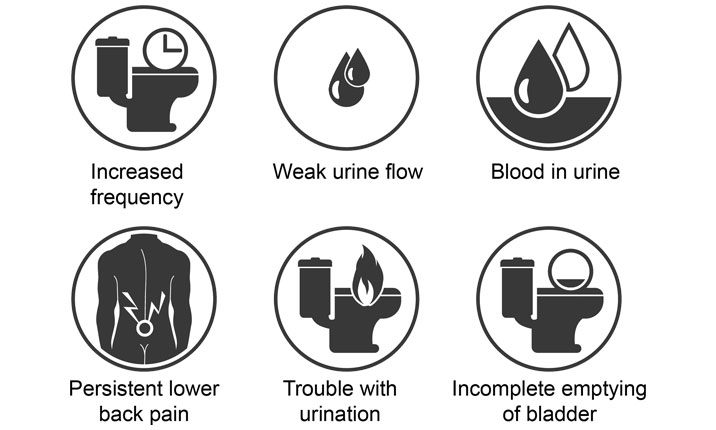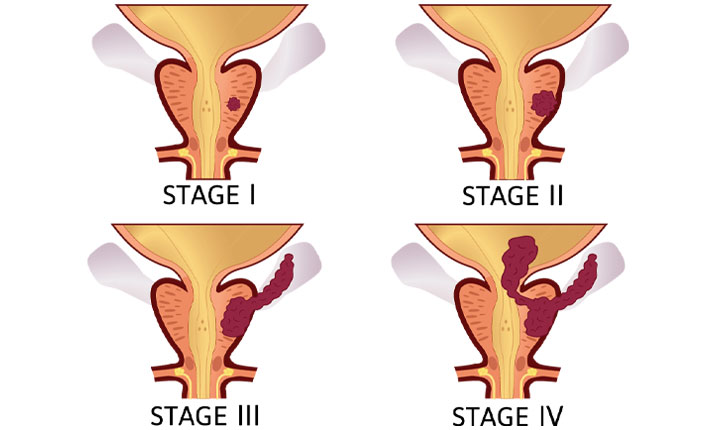
Prostate Cancer: Causes, Symptoms and Treatment | Health Plus
03 Dec 2020
Prostate cancer is the third most common cancer affecting men in Singapore, and usually affects men older than 50. Read on to find out about the causes, symptoms and treatments available for prostate cancer.
What is the prostate?
The prostate is a walnut-sized gland that is part of the male reproductive system. It sits below the bladder in front of the rectum, and forms a ring around the urethra (the tube that carries urine out of the bladder and body). The function of this gland is to secrete fluid that is part of the semen which nourishes, protects and transports sperm.
What are the causes of prostate cancer?
Prostate cancer develops when normal cells in the prostate gland change into abnormal cells and grow out of control. This may be due to mutations in the abnormal cells' DNA. The abnormal cells continue to live and grow, when other normal cells would die. This results in the formation of a tumour that can invade surrounding structures, causing damage. Some abnormal cells can even break away and spread to other parts of the body.
Although prostate cancer is common, the cancer is not typically fatal as it usually grows very slowly. It does not cause serious harm when confined to the prostate gland. However, there are aggressive types of prostate cancer which can spread rapidly to lymph nodes and other organs such as the bone.
What are the symptoms of prostate cancer?

Early-stage prostate cancer usually does not have any symptoms. Some warning signs of prostate cancer include:
- increased frequency of urination
- weak and interrupted urine flow
- trouble with urination or straining on urination
- incomplete emptying of bladder
- blood in urine or semen
- persistent lower back pain
Do note that presence of these symptoms may not necessarily be due to prostate cancer and can be due to other conditions. However, you should consult your doctor for further assessment if any of the above symptoms persist.
What are the risk factors for prostate cancer?
Risk factors for prostate cancer include:
- Age: The risk of prostate cancer increases with age, and is most common in men above 50
- Race: Men of African ethnicity have a higher risk of prostate cancer compared to men of other races. In addition, the prostate cancer seen in African men are more likely to be aggressive or advanced.
- Smoking: Smoking increases your risk of developing aggressive forms of prostate cancer, and prostate cancer spreading beyond the prostate
- Family history of prostate cancer: Men with a father, brother or uncle with prostate cancer have an increased risk of developing prostate cancer.
How is prostate cancer detected?
Screening for prostate cancer is important because it offers the hope of catching prostate cancer early before it has a chance to grow, spread and cause symptoms. As with all cancers, early diagnosis is important because it translates to early and more effective treatment, and reduced morbidity and mortality. For early-stage cancers, the 5-year survival rate is more than 95%.
Screening can be done via a blood test called the PSA (Prostate Specific Antigen) test. PSA is a protein made by the prostate and is usually found in higher levels in men with prostate cancer. Men aged between 50 to 70 years, or those at a higher risk of prostate cancer are recommended to take the test. However, prostate cancer is not the only condition that causes raised PSA levels. As other conditions such as an enlarged prostate (benign prostatic hyperplasia) and prostate infection can also cause raised PHA levels, further tests will need to be done to confirm the diagnosis if prostate cancer is suspected.
These include:
- A rectal examination where a doctor puts a finger up the anus and into the rectum to feel for abnormal areas on the prostate.
- A biopsy which involves using a needle to take a sample from the prostate for testing.
- An ultrasound where a small probe is placed in your rectum to scan for abnormalities in the prostate.
- A Magnetic Resonance Imaging (MRI) scan to scan for abnormalities in the prostate.
What are the different stages of prostate cancer?

Cancer staging is a system to describe the size, aggressiveness and how far a cancer has spread. Staging is important in the management of cancer because it helps to guide treatment and predict the chance of cure.
A prostate cancer's stage is based on the following:
- How far the cancer extends in the prostate and the surrounding tissue
- Whether the cancer has spread to nearby lymph nodes
- Whether the cancer has spread to other organs (eg. liver, bone)
These 3 categories, along with the PSA test, are used to assign a prognostic stage group. There are 4 stages in cancer staging (stage I to IV):
- Stage I and II: localised cancer
- Stage III: locally advanced cancer
- Stage IV: advanced or metastatic cancer with spread outside of prostate (either locally to involve bladder, rectum, lymph nodes or to distant areas like the bones)
In general, lower stage cancers are less aggressive and less likely to recur after treatment.
How can prostate cancer be treated?
There are several treatment options for prostate cancer. The choice of treatment depends on the patient's age, health, preference and stage of cancer.
For stage I and II cancers, treatment includes:
- Active surveillance where patients choose not to have treatment right away. Routine tests are used to monitor the cancer and active treatment is only started when it starts to grow more quickly. This is usually appropriate for men with very low- and low-risk cancers.
- Surgery to remove the prostate gland (radical prostatectomy)
- Radiation therapy, sometimes combined with hormone therapy
For stage III cancers, treatment often includes a combination of two approaches:
- Radiation therapy with hormone therapy
- Removal of the prostate gland
Stage IV advanced cancer (prostate cancer with metastasis) is not curable, but treatment can often help to control the disease for prolonged periods of time, hence reducing symptoms and improving quality of life. It is usually treated with a combination of different approaches, which may include hormone therapy, chemotherapy, radiotherapy or immunotherapy. Surgery is usually not offered when there is spread to the other parts of the body such as the bones (distant metastasis).
Can prostate cancer be prevented?
Your risk of developing prostate cancer can be reduced by having a healthy lifestyle, including regular exercise and a healthy diet. You should consume fruits, vegetables and whole grains, and avoid a high-fat diet.
Address your concerns early
Should you be concerned about your symptoms, please see your general practitioner or make an appointment with a urologist, who will be able to address your concerns and provide you with an accurate diagnosis of your condition.
Article contributed by Dr Edwin Chng, medical director at Parkway Shenton, One Raffles Quay
References
Don't let your chance of beating prostate cancer go up in smoke. (2015, December 21). Retrieved November 19, 2020, from https://www.hopkinsmedicine.org/brady-urology-institute/specialties/conditions-and-treatments/prostate-cancer/prostate-cancer-questions/dont-let-your-chance-of-beating-prostate-cancer-go-up-in-smoke
Prostate Cancer. (2018, November 22). Retrieved November 19, 2020, from https://www.singhealth.com.sg/patient-care/patient-education/prostate-cancer
Schmidt, C. (2018, November 26). Smoking tied to more aggressive prostate cancer. Retrieved November 19, 2020, from https://www.health.harvard.edu/blog/smoking-tied-to-more-aggressive-prostate-cancer-2018112615452
Singapore Cancer Registry Annual Registry Report 2015 (Rep.). (2017, June 19). Retrieved November 19, 2020, from National Registry of Diseases Office (NRDO) website: https://www.nrdo.gov.sg/docs/librariesprovider3/Publications-Cancer/cancer-registry-annual-report-2015_web.pdf?sfvrsn=10




